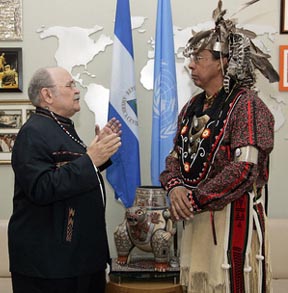 |
Book Reviews
Examining the Mystery of God’s Church
Toby Westerman
Book-review on Ecclesia by Atila S. Guimarães,
(Los Angeles: Tradition in Action, 2009), 320 pp.
Atila Guimaraes’ latest book, Ecclesia, is the eleventh and concluding volume of the Collection Eli, Eli, Lamma Sabacthani? on the Second Vatican Council and the revolution it ignited within the Catholic Church.
Those already acquainted with Guimaraes and his work will be gratified to find the author again carefully guiding the reader in the exploration of the most pivotal event of time: Vatican II and its tragic aftermath.
For those unacquainted with Guimaraes, Ecclesia offers an introduction to the work of one of the finest analytical minds writing today.
It is a rare gift to explain complex and controversial material clearly, and rarer still to make these issues compelling for the reader. Guimaraes has been blessed with these talents and supports his discussion with years of research.
As with all of Guimaraes’ previous works, the reader does not merely encounter cold rationality assembled to win a point of contention, but he is taken through a process of careful investigation generated by the author’s deep love for the Church.
Behind the author’s impeccable reasoning, detailed analysis, and factual support is a deep passion for what Christ gave to humanity for its salvation. Guimaraes is determined to stop this Divine gift from becoming an exercise in political manipulation and social justice.
God’s blessing and forgiveness - and His establishment of a Church on earth for human salvation - is unfathomable. How God reaches out to fallen humanity is a great mystery beyond the conception of the human mind.
Ecclesia analyzes this spiritual concept of “mystery,” contrasting the traditional understanding of the term with interpretations employed by prominent supporters of Vatican II.
Guimaraes points out that although the term ”mystery” is “one of the most … if not the most” important doctrinal concepts of Vatican II, it was never specifically defined by the Second Vatican Council.
Within his discussion of “mystery,” Guimaraes confronts the often-invoked Vatican II themes of “the People of God,” “Poor Church,” “Sinning Church,” “Servant Church,” “Church of Love,” and the “Church Tolerant,” systematically demonstrating how each is both hostile to traditional Catholic teaching and destructive of the Faith.
Although Guimaraes’ mission is to defend the ancient traditions of the Catholic Faith, his work is as timely as those traditions are timeless. The section on the “Poor Church” is particularly compelling in that the concept of “Poor Church” asserts that the Catholic Church should both identify with the poor and itself become poor.
Among the prominent supporters of Vatican II whom Guimaraes cites to explain “Poor Church” is the liberal theologian Luis Maldonado. The “Church’s degree of self-identity lies in reverse proportion to her relevance, brilliance and social triumph,” declares Maldonado. “Where and when the Church re-discovers her identity, her relevance or importance diminishes. And in the reverse sense, when she acquires importance and relevance, she begins to lose identity,” Maldonado asserts.
This one citation alone leads to the conclusion that, for many liberals in the Church, complete identity of the Catholic Faith lies only in absolute annihilation, a proposition with which the Church’s enemies would completely agree.
“Poor Church” metastasized into Liberation Theology, and Latin America shows the tragic results of this pathology. Thousands, if not millions, of former Catholics are now flocking to Protestant churches, Marxist political movements, or “indigenous” (read, pagan) religions.

UN President Fr. d'Escoto promoting indigenous
cultures and religions |
Just as many Catholic teachers ceased instructing the faithful in traditional Catholic truths and embraced the Marxist elements of Liberation Theology - the likes of Hugo Chavez of Venezuela and Evo Morales of Bolivia have turned Jesus from the God-Man Redeemer into a proto-Marxist revolutionary or, at least, a red-green eco-fanatic.
The abandonment of the Faith by many Catholic bishops, priests, and other religious teachers has left the world’s population open to the seductive lies of the new, world-wide Communist movement.
Liberation Theology in action is seen in the career of Miguel d’Escoto Brockmann. Born in Los Angelus, California, d’Escoto became a Maryknoll priest, but he embraced Liberation Theology to the point that he eventually became foreign minister of the Marxist Sandinista government of Nicaragua. D’Escoto now serves as President of the United Nations General Assembly (September 2008 to September 2009) and continues to extol Marxist solutions to world problems while ignoring his own priestly vows and papal condemnation.
Guimaraes concludes his work with a call for the Church not merely to turn its back on questionable Vatican II pronouncements, but to take the unprecedented step to reconvene Vatican I, interrupted by the troops of Napoleon III in 1870, and to complete the agenda laid out by Pius IX.
The reader will find Guimaraes’ Ecclesia a most thought provoking experience, whether as part of the entire Collection or as a stand alone work. Copious footnotes in several languages support the author’s argumentation, and an impressive bibliography is included at the end of the book.
Anyone who seeks an honest, carefully reasoned critique on the fruits of Vatican II will not be disappointed in Ecclesia.
Posted July 22, 2009

Mr. Westerman is the author of
Lies, Terror, and the Rise of the Neo-Communist Empire.
He is the editor and publisher of
International News Analysis Today

|
Related Works of Interest
|
Book Reviews | Home | Books | CDs | Search | Contact Us | Donate

© 2002-
Tradition in Action, Inc. All Rights Reserved
|
 |

|